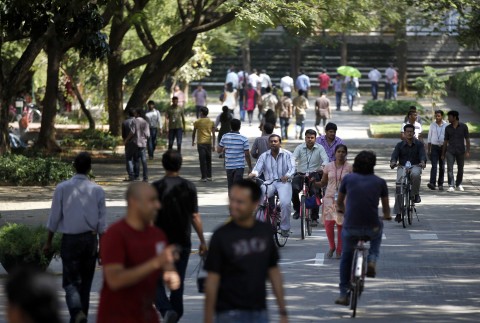It’s time to clean up the visa mill for skilled guest workers
Published on April 13th, 2017
Infosys Technologies employees in Bangalore, India. (Aijaz Rahi/Associated Press)
By Editorial Board
April 12, 2017
The Washington Post
THE TRUMP ADMINISTRATION is taking its first, cautious steps to clean up the much-abused H-1B visa system, by which skilled foreign workers are imported to fill jobs in the technology sector and other specialty occupations. The moves so far, mainly involving tighter oversight are fine but inadequate. Deeper reforms are needed for a program that, while vital to maintain the nation’s competitiveness, has been used to displace well-paid and older American workers with cheap and ostensibly temporary foreign labor and to turn some of those guest workers into virtual indentured servants.
As a candidate, Donald Trump talked out of both sides of his mouth, at different points saying he favored importing skilled guest workers into the United States and saying he didn’t like it, citing well-documented instances of abuse. (Among the worst involved Disney, which required American workers to train their lower-paid foreign replacements.)
Now, as president, Mr. Trump is starting to move. Just as tens of thousands of H-1B applications were filed last week, the administration announced that enforcement agents would intensify site visits to the companies that rely most heavily on the guest-workers program, especially Indian outsourcing firms that use it to import tens of thousands of information-tech workers annually. The goal will be to ensure that the guest workers qualify as “specialty” labor, which is a requirement of H-1B visas.
At the same time, the Justice Department announced it would not tolerate employer misuse of that program to discriminate against or displace American labor.
Employers and some economists are at odds over the extent to which companies face a shortage of American workers to fill tech and other skilled jobs. A frequently cited figure of 500,000 unfilled positions may be somewhat inflated, but there is no doubt that U.S. colleges and universities cannot keep up with the demand for graduates, especially with advanced and highly specialized degrees.
Hence the importance of the H-1B program, which grants 85,000 visas annually to guest workers, nearly three-quarters of them from India — a fraction of the overall applications. Of that number, many have only bachelor’s degrees and are chosen by lottery; just 20,000 are foreign graduates of U.S. universities with advanced degrees.
Reforms are needed on several fronts. For starters, H-1B visa holders already in the country should be allowed to change jobs to prevent their exploitation by employers. More fundamentally, the program should be retooled to ensure that genuinely high-skilled labor is prioritized, not that of entry-level programmers. That may disadvantage the big Indian outsourcing firms that flood the system with applications; so be it.
The current minimum salary of $60,000 for some programmers and other H-1B recipients must also be raised to an amount closer to the prevailing wage for comparably skilled American workers, which is more than $100,000. Otherwise, the visas will be continued to be used in too many cases to push U.S. employees onto the unemployment rolls.





